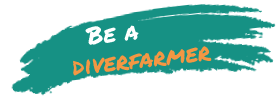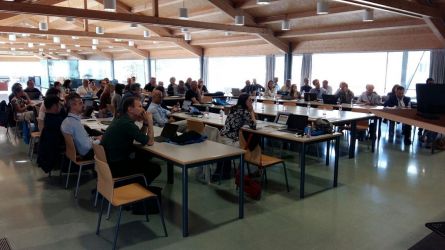The Diverfarming project is under way, and will work for five years with the aim of offering a change in paradigm that banishes intensive agriculture and improves biodiversity
Intensive agriculture based on monocropping has endangered the biodiversity of species in Europe, which comes at a high environmental cost. The international team involved in the Diverfarming project, within the European Commission’s Horizon 2020 programme, and in which the Technical Universities of Cartagena and Cordoba participate, has set the objective of proposing a change of paradigm in agricultural management and practices.
In total, sixty researchers from universities, research institutes, agrarian, logistics and machinery companies from eight European countries have met this week in the Technical University of Cartagena to agree on the roadmap for this five-year-long project. In the debates held over the last three days, all the participants have coincided in highlighting that the diversification of crops under low-input management practices can be an alternative to the current intensive agricultural models, with improvements in environmental quality and therefore in the long-term sustainability of the agrarian systems, but also offering economic benefits to the farmer.
To achieve said change in mentality, Diverfarming will work directly with farmers, organising at local level to achieve a global change. This means that the particular climatic, cultural, and technical aspects of each region will be taken into account. Moreover, the socioeconomic and environmental problems linked to each region must be reduced; therefore the type of diversification will be defined according to this premise.
The agreements that the team has reached this week, include the elaboration of a common implementation protocol for the project across all the regions, to enable results to be comparable. This common protocol will be exposed and validated in a seminar to take place in early 2018 in the German city of Trier. Collaboration among the participants of the protocol is essential to successfully achieve the objectives, for which, although the cases studies are approached taking into account the regional characteristics, agronomic researchers, mathematicians, economists, sociologists, biologists, environmental scientists, or chemists of all the consortium will collaborate in the measuring and analysis of other regions in a synergic manner.
The project is structured in different work packages with independent objectives which, although they are closely interrelated, present different time scales. This last work package implies contact with professionals from the agricultural sector to gather their experience regarding farming management practices and crop diversification, and who evaluate from their own experience, what the best alternatives would be for each region. In this way, only those alternatives that are supported by the professionals from the agricultural sector will be tested in the field in the experimental stage, to provide solutions to real problems. Diverfarming will work in direct contact with the farmers seeking to find the most efficient management techniques to precisely define the type of diversification for each region and the low-input management techniques which have received most support from end users, so that they are tested in strategic experimental fields which the farmers would be willing to implement in their farms.











